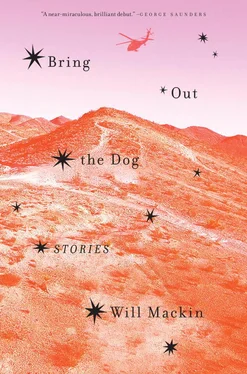Will Mackin - Bring Out the Dog
Здесь есть возможность читать онлайн «Will Mackin - Bring Out the Dog» весь текст электронной книги совершенно бесплатно (целиком полную версию без сокращений). В некоторых случаях можно слушать аудио, скачать через торрент в формате fb2 и присутствует краткое содержание. Город: New York, Год выпуска: 2018, ISBN: 2018, Издательство: Random House Publishing Group, Жанр: prose_military, на английском языке. Описание произведения, (предисловие) а так же отзывы посетителей доступны на портале библиотеки ЛибКат.
- Название:Bring Out the Dog
- Автор:
- Издательство:Random House Publishing Group
- Жанр:
- Год:2018
- Город:New York
- ISBN:978-0-812-99564-0
- Рейтинг книги:5 / 5. Голосов: 1
-
Избранное:Добавить в избранное
- Отзывы:
-
Ваша оценка:
- 100
- 1
- 2
- 3
- 4
- 5
Bring Out the Dog: краткое содержание, описание и аннотация
Предлагаем к чтению аннотацию, описание, краткое содержание или предисловие (зависит от того, что написал сам автор книги «Bring Out the Dog»). Если вы не нашли необходимую информацию о книге — напишите в комментариях, мы постараемся отыскать её.
Bring Out the Dog — читать онлайн бесплатно полную книгу (весь текст) целиком
Ниже представлен текст книги, разбитый по страницам. Система сохранения места последней прочитанной страницы, позволяет с удобством читать онлайн бесплатно книгу «Bring Out the Dog», без необходимости каждый раз заново искать на чём Вы остановились. Поставьте закладку, и сможете в любой момент перейти на страницу, на которой закончили чтение.
Интервал:
Закладка:
Moby pinched his nose to make his voice sound like Keebler’s. “I advise you to seek immediate shelter,” he said. “There’s a large convention of dorks moving in.”
I remembered looking down on a thunderstorm at night, from my perch in the Queer, seeing green lighting shudder in an anvil cloud, watching blue streaks of hail shoot out of the top.
A clear bolt of lightning tore the dark sky in half.
“Keebler was right, though,” I said.
“That’s the problem with you pilots,” Moby said. “You’re wrapped too goddamn tight.”
SEALs had their own problems, but being uptight wasn’t one of them. If anything, they’d gone too far in the opposite direction.
“Like, why can’t you just sign me off?” Moby asked.
I rolled into a muddy pond in third gear without saying a word. Cold water seeped up through the perforated floorboards. Moby was asking me to forge his paperwork, to make him a JTAC without having him jump through the requisite hoops. Which I probably could’ve done, and nobody would’ve cared. But this was Reed’s question to answer, not mine, because if Moby failed to qualify then Reed would have to deploy again. And it was Reed, not me, who was haunted by that contingency op back in Yemen, which had gone so wrong back in October. Reed and I were brothers—by fire, not blood—and I only wanted what was best for him. If that meant working overtime to get Moby legally qualified, then so be it. And if that meant forging the paperwork to give Moby a qualification that he didn’t earn, well, then, so be that, too. The muddy water had risen above my boots. Feeling my way through a downshift, I dug out of the pond in second gear.
“You gotta do the whole JTAC syllabus,” Reed said. “Start to finish.”
“Like we have time for that,” Moby said.
“Stranger things have happened,” Reed said.
“What if I asked Jimmy to sign me off? You think he’d do it?”
Jimmy was a SEAL, too, and the leader of Three Troop, to which Reed was assigned. Jimmy was also the Hero of the Battle of Koshwan Ghar.
“Jimmy can do whatever the fuck he wants,” Reed said.
THE CONTROL TOWER, with its faded red-and-white checkerboard paint job, appeared in the headlights. Its entrance was boarded up. Rainwater gushed from a broken drainpipe. I parked the deuce-and-a-half at the base of the tower, and left the keys in the driver’s-side visor. We transferred all our gear—radios, compasses, laser range finders, et cetera—into the Suburban, which was brand-new, bone-dry, and smelled like leather. Its high beams obliterated the rain, and I could barely hear the thunder from inside. I drove east off the range and took a left onto 264—a wide, freshly paved highway, with deep woods on either side. As I navigated the highway’s gentle curves through the storm, Reed and Moby fell asleep.
It was two and a half hours back to our compound in Virginia, which would’ve put us there around ten. Normally, at that hour, the parking lot would be empty. But it would be even more so at this time of year, under holiday routine, with both the SCIF and the armory closed. The only car that would be in the lot, then, was Jimmy’s jet-black 1972 Lincoln Continental—with its fastback, vinyl roof, and 460 V-8; with its peekaboo headlights and hood ornament like the crosshairs off a Soviet anti-aircraft gun. Jimmy had no wife, no kids, and no life outside our covert band of hooligans. Some said Jimmy owned a mansion out in Hilltop, with teakwood floors, granite countertops, and an infinity pool; but for all practical purposes, Jimmy lived on the compound, in a tin shack behind the dive locker, behind the paraloft, and behind the kill house where we practiced our assaults. I’d find Jimmy in that shack, on the couch, possibly hammered, watching TV.
Jimmy loved this twenty-four-hour network that showed nothing but soaps, which, personally, I couldn’t abide. Watching the same two impossibly attractive people face off in the same dimly lit, overdecorated rooms, in order to hash out the same old ridiculous problems, day after day, seemed to me a waste of time. Honestly, I equated such behavior with weakness. But that was hard to reconcile in Jimmy’s case.
The Battle of Koshwan Ghar had taken place at the top of an eleven-thousand-foot mountain, in two feet of snow, back when the war was young. A drone had recorded the action via its infrared camera, and I’d watched the playback many times over the years, either as part of the viewing audience during the official commemoration on the anniversary of the battle, or alone at my desk on any given morning.
Hot is black in the video, and Jimmy’s thermal signature is the blackest thing onscreen. Blacker than the exposed slabs of granite that had spent all day absorbing the sun’s rays. Blacker than the muzzle flash of the Taliban’s PKM. And blacker than Jimmy’s pinned-down troopmates. Jimmy maneuvers under fire to take cover behind a petrified mulberry tree whose trunk immediately bursts into splinters. From there, Jimmy sprints toward the PKM itself, taking three spectacular strides before he gets hit in the leg, rolls in the snow, pops up, then proceeds to give the Taliban the good news. That was Jimmy’s term for it, anyway, repurposed from the gospel. I didn’t know if I’d ever find redemption, but watching that video of Jimmy on Koshwan Ghar seemed pretty damn close. And rewatching it every so often was my version of going to church.
Highway 264 ended at a T-intersection with a blinking yellow light. I took a right, rolled downhill into Manns Harbor, then across a low, concrete bridge with rhythmic tar seams. The water on either side churned like Hokusai’s The Great Wave, with peaks rising over the bridge and halfway up the lampposts. Reed slept up front and Moby snored in back as we rolled off the bridge onto Bodie Island, where I took a left at a four-way intersection with a dark traffic light. The road would carry us north past Kill Devil Hills and the Wright Brothers’ monument, past the home of Grave Digger, the famous monster truck, and into Virginia. My plan was to drop Moby off at his shithole in Pungo, and Reed at his apartment in Princess Anne, before driving to the compound at Dam Neck. I’d park next to Jimmy’s magnificent Lincoln, then walk in the rain past the paraloft and the kill house to the dive locker. Golden light would shine out the seams of Jimmy’s tin shack, nestled in the sand dunes.
Driving north through sea spray, past boarded-up strip malls and wobbly stop signs, I imagined the conversation that would take place between Jimmy and me.
“Now, who’s this guy?” Jimmy would ask from the couch.
I’d be standing on the rug by the TV. “Moby,” I’d say. “He’s from Team Four.”
“And what’s his fuckin’ problem?”
“He doesn’t have the aptitude to be a JTAC. I’m sure he’ll make a great assaulter, but…”
“What do you know about being an assaulter?” Jimmy would ask, staring.
The TV, on mute, would be showing a rerun of One Life to Live. Specifically, that epic scene where Real Bo returns from Parts Unknown to confront Fake Bo.
“And why can’t Reed deploy?” Jimmy would ask.
“He’s done, mentally,” I’d say. “Those cluster-bombed kids in Yemen really messed him up.”
“And you’re still with One Troop?”
“Yeah.”
“I could talk to Hal. Bring you over.”
Hal, the leader of One Troop, was another hero, with another story.
“I’d rather not get in the middle of that,” I’d say.
My attention returned to the road. Up ahead, I saw flashing lights. A little closer, cops appeared in shiny raincoats, sparking flares. A giant section of the road had been washed out by the storm. I turned around and went the other way, hoping to find a hotel.
Читать дальшеИнтервал:
Закладка:
Похожие книги на «Bring Out the Dog»
Представляем Вашему вниманию похожие книги на «Bring Out the Dog» списком для выбора. Мы отобрали схожую по названию и смыслу литературу в надежде предоставить читателям больше вариантов отыскать новые, интересные, ещё непрочитанные произведения.
Обсуждение, отзывы о книге «Bring Out the Dog» и просто собственные мнения читателей. Оставьте ваши комментарии, напишите, что Вы думаете о произведении, его смысле или главных героях. Укажите что конкретно понравилось, а что нет, и почему Вы так считаете.












